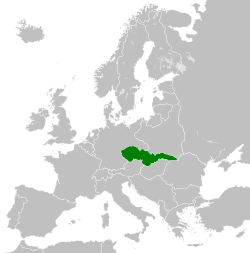Czechoslovak Republic (1918–1938)
| Czechoslovak Republic | ||||||||||||||||||||
| Československá republika | ||||||||||||||||||||
|
||||||||||||||||||||
|
||||||||||||||||||||
|
Motto Pravda vítězí / Pravda víťazí "Truth prevails" |
||||||||||||||||||||
Anthem
|
||||||||||||||||||||
|
The Czechoslovak Republic in 1938.
|
||||||||||||||||||||
| Capital | Prague | |||||||||||||||||||
| Languages | Czech, Slovaka | |||||||||||||||||||
| Government | Parliamentary republic | |||||||||||||||||||
| President | ||||||||||||||||||||
| • | 1918–1935 | Tomáš Masaryk | ||||||||||||||||||
| • | 1935–1938 | Edvard Beneš | ||||||||||||||||||
| Prime Minister | ||||||||||||||||||||
| • | 1918–1919 | Karel Kramář (first) | ||||||||||||||||||
| • | 1935–1938 | Milan Hodža (last) | ||||||||||||||||||
| Legislature | National Assembly | |||||||||||||||||||
| • | Upper house | Senate | ||||||||||||||||||
| • | Lower house | Chamber of Deputies | ||||||||||||||||||
| Historical era | Interwar period | |||||||||||||||||||
| • | Independence declared | 28 October 1918 | ||||||||||||||||||
| • | Constitution adopted | 29 February 1920 | ||||||||||||||||||
| • | Munich Agreement | 30 September 1938 | ||||||||||||||||||
| Area | ||||||||||||||||||||
| • | 1938 | 140,800 km² (54,363 sq mi) | ||||||||||||||||||
| Population | ||||||||||||||||||||
| • | 1938 est. | 14,800,000 | ||||||||||||||||||
| Density | 105.1 /km² (272.2 /sq mi) | |||||||||||||||||||
| Currency | Czechoslovak koruna | |||||||||||||||||||
|
||||||||||||||||||||
| Today part of | ||||||||||||||||||||
| a. German, Hungarian, Polish, Romani, Ruthenian, and Yiddish had regional status. | ||||||||||||||||||||
The first Czechoslovak Republic (Czech / Slovak: Československá republika) was the Czechoslovak state that existed from 1918 to 1938. The state was commonly called Czechoslovakia (Československo). It was composed of Bohemia, Moravia, Czech Silesia, Slovakia and Subcarpathian Ruthenia.
After 1933, Czechoslovakia remained the only functioning democracy in central and eastern Europe. Under pressure from its Sudeten German minority, supported by neighbouring Nazi Germany, Czechoslovakia was forced to cede its Sudetenland region to Germany on 1 October 1938 as part of the Munich Agreement. It also ceded southern parts of Slovakia and Subcarpathian Ruthenia to Hungary and the Zaolzie region in Silesia to Poland. This, in effect, ended the First Czechoslovak Republic. It was replaced by Second Czechoslovak Republic, which lasted less than half a year before Germany occupied the rest of Czechoslovakia.
The independence of Czechoslovakia was proclaimed on October 28, 1918, by the Czechoslovak National Council in Prague. Several ethnic groups and territories with different historical, political, and economic traditions had to be blended into a new state structure. The origin of the First Republic lies in Point 10 of Woodrow Wilson's Fourteen Points: "The peoples of Austria-Hungary, whose place among the nations we wish to see safeguarded and assured, should be accorded the freest opportunity to autonomous development."
...
Wikipedia


